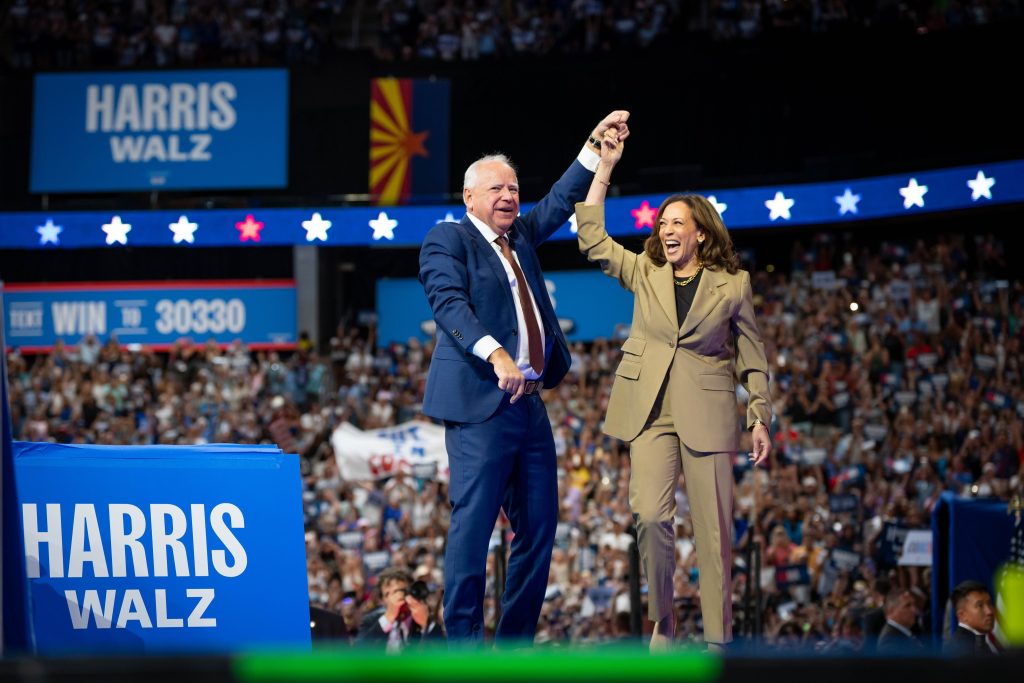Podcast: Play in new window | Download | Embed

The Democratic National Convention kicks off this week in Chicago.
Vice President Kamala Harris is expected to receive her party’s nomination for presidential candidate, to run against former president, Republican Donald Trump.
Courting the Native American vote is seen as vital with tight contests in key battleground states with sizable Indian populations.
Last week at a rally in Glendale, Ariz., Harris appealed to Native voters.
“…As president, I will tell you, I will always honor tribal sovereignty, and respect tribal self-determination.”
Arizona, Wisconsin, Michigan, and Nevada have high numbers of Native Americans and are all considered battleground states this year.
Former president Trump has also courted the Native vote, including at an October 2020 stop in North Carolina.
“Way up here, Native Americans. That’s why we’re here. The last administration promised to bring hope and change to Indian Country. But they cruelly abandoned you the moment they got your vote. And they went to Washington. That’s what they do.”
Trump lost his re-election bid, with many Native Americans criticizing his ending of an annual White House Tribal Nations Conference started by President Obama, and the curtailing of environmental regulations while president.
And his running mate J.D. Vance has fired up controversy over past remarks on Two Spirits and Indigenous Peoples Day.
Issues being raised by Native Americans this campaign season include water rights, education, health care, and leniency for Leonard Peltier, among others.
Stay tuned to National Native News all this week with reports from the DNC by Antonia Gonzales as part of our Native Vote 2024 coverage – and a special live program Thursday night during Harris’ acceptance speech on NV1.org and your local station

Mount Konocti in Lake Co., Calif. (Photo: tawnn)
Voters across a rural Northern California county will decide whether to change the name of a town that honors a 19th century settler who had enslaved and murdered Pomo and Wappo peoples.
Jacob Resneck reports.
The town of Kelseyville was named for Andrew Kelsey, who in the 1840s, raped, tortured, and murdered Indigenous peoples forced to work on his cattle ranch near Clear Lake about 85 miles northeast of San Francisco.
He and his business partner were killed in an 1849 uprising led by the Pomo and Wappo people he had enslaved.
The following year, a bloody reprisal by the U.S. Calvary killed hundreds of Pomo, mostly women, old men, and children in a dark chapter known as the Bloody Island Massacre.
For decades, the name Kelseyville has been controversial as it honors a man who had committed crimes against Pomo and Wappo peoples.
And a citizen movement has, in recent years, pushed to change the town’s name to Konocti, after the 4,300 ft volcano that towers over the town.
Opponents to the name change had urged the county supervisors to limit an advisory vote to those who live in the immediate community.
But Lake County Supervisors voted 3-2 last month to make the vote countywide.
Supervisor Moke Simon, who is also tribal chairman of the nearby Middletown Rancheria of Pomo Indians, said it will be a referendum on how far Lake County has evolved in its understanding of history that predates European settlement.
“I want it on record where this county stands with the Indigenous people that lived here and have been here before it was created.”
The non-binding vote will appear on the November 5 ballot, but the ultimate authority to change the community of Kelseyville’s name to Konocti lies with the U.S. Board on Geographic Names.
Get National Native News delivered to your inbox daily and stay up-to-date on the 2024 Native Vote. Sign up for our daily newsletter today.



